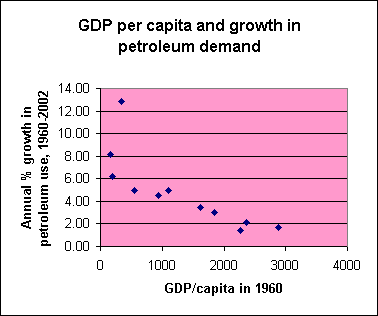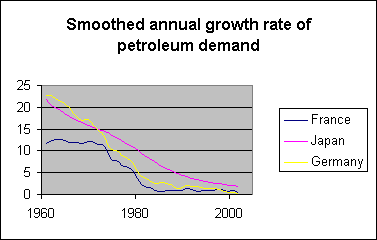If China’s oil demand keeps growing at its current rate, it could produce some real problems. But I see a number of reasons to expect that the growth will slow down significantly.
China accounted for over a third of the global increase in petroleum demand over the last 3 years. The Oil Drum calls our attention to this article by Mike Watkins at TrendVue:
Using statistics from British Petroleum’s 2005 Statistical Review of World Energy, I calculate the average (over a 10 year period) consumption growth for China (7.904%) and the US (1.484%), and extrapolating demand growth using these numbers, China will surpass the US as the world’s largest energy consumer by 2023.
This startling outcome seems unlikely as China’s GDP will still fall far behind the US at that stage. Yet Chinese demand growth doesn’t have to increase at such a rate to put a severe strain on world crude capacity. Even nominal energy consumption growth suggests that China and the US collectively each new year will require an additional 600 thousand to 1.2 million barrels per day.
It is intriguing to try to extrapolate historical patterns like this, but it seems a safe bet that the realization will be characterized by substantially slower demand growth than the straightforward calculation suggests. First, as Watkins points out, it is hard to see where such increases in petroleum production are physically going to come from. Long before these projections could become a historical reality, price increases would choke back demand to force it to keep in step with more finite global production.

Even in the absence of any price increases, however, it seems likely that future Chinese growth in petroleum demand is going to slow down considerably. For one thing, I am not among those who expect China’s real GDP to continue to grow near double digit annual rates for the next 20 years. As a statistician, if I’m trying to predict China’s economic growth rate for a long period into the future, I would look not just at the recent past of China but further at the broad experience of any of a number of countries over time. What’s been happening in China is quite unusual in a broader historical context, and from a purely statistical viewpoint, you’d have to expect its future growth rate to be less of an outlier than the last 20 years have been.
Furthermore, if the growth rate of China’s petroleum demand does not slow down, that would represent quite a different pattern of energy use than we’ve seen elsewhere. The above diagram compares the average annual growth rate in petroleum demand over 1960-2002 for 11 different countries with the level of GDP per person in that country in 1960. There is a fairly strong correlation– the richer the country was in 1960, the slower in percentage terms its petroleum use has grown over the last 40 years, with the richest country at the start of that period (the United States) exhibiting one of the slowest growth rates of petroleum use.

Not only did oil demand grow more slowly in the richer countries, if you follow an individual country as it becomes richer, you see the growth rate of petroleum demand slow down in that country. The graph at the left summarizes the experience for France, Germany, and Japan over the last half century. The annual growth rate of petroleum use shown here has been filtered with exponential smoothing (decay factor = 0.9) in order to emphasize the broader trends and smooth out the cyclical fluctuations. It’s apparent that as each of these countries grew richer, its growth in petroleum demand fell off quickly.
Does that put us out of the woods? None of this means that petroleum demand actually falls, only that the rate of increase coming from China should slow down. And Watkins leaves us with this sobering observation:
Note we’ve only been talking about one rapidly developing economy– China. We’ve not said word one about India. And what of other nations, some of them net exporters now?
Good question, Mike.
India is also growing very well. The main point is Indias future seems to be devoid any obvious threats whereas china’s is clouded with peg.. bad financial state.. etc
India’s service sector is no doubt going to grow and thereby the GDP. Oil consumption is therefore going to grow as well. You can leave out a nation with more than billion people. 🙂
Catching my eye: morning A through Z
I’ve been a little out-of-touch for the last few days so this post may include links to a few things that have been around for a couple of days. Here’s what’s caught my eye this morning: I didn’t know until…
Thanks Dr Hamilton. I enjoyed your points about China’s demand for crude and output over the next 2 decades. I think that it would be very worthwhile for everyone to have a look at Paul Krugman’s note written I believe in the late 1990s in Foreign Affairs entitled “The Asian Miracle” where he points out that ‘input growth’ vs. productvity growth was more responsible for the rapid Asian economic rise that led to bust in 1997. Moreover, Alwyn Young has written a recent NBER paper that uses Chinese Official data and questions the reported growth statistics. In fact, using their data, he points out that gdp growth reports do not deflate annual economic growth so the 8.5 to 9.0 percent annual real gdp growth is misleading and false from 1978 – 1998 but instead averages about 6.5 percent growth with a 2.5 percent growth rate in productivity.
When markets get ‘frothy’ as Mr. Greenspan has recently pointed out with respect to US housing markets, all of a sudden they seem to become ‘very confident’ and have no problems with extrapolating the next 10 to 20 years. Meanwhile, costs continue to rise, investment patterns change, risk increases, busts occur, and new mini cycles emerge. Accoridingly, I view it as foolish to expect that 20 years from now being clearly visible as far as China’s growth is concerned.
Great note Dr. Hamilton!!
SIR – To which extent could the regression of growth in petroleum demand on GDP per capita be plagued by Francis Galton’s classical fallacy of regression towards the mean [http://econ.lse.ac.uk/~dquah/dp-93galfall.html]?
Thanks for the invitation to give a brief statistics lecture, Michael.
The phenomenon of regression towards the mean describes the fact that, if your father is taller than average, you’re more likely than not to be shorter than your father, whereas if your father is shorter than average, you’re more likely than not to be taller than your father. This statement is not a fallacy, it is an absolutely true statistical fact about what you should predict about your height if you know your father’s height.
The fallacy comes in if you tried to conclude from the true fact of regression towards the mean that everybody must be getting more average over time. In fact, regression towards the mean is an equally valid characterization looking backward in time. If you’re taller than average, then your father is more likely than not to be shorter than you. That turns out to be another true implication of the principle of regression towards the mean.
Michael is entirely correct that some of the arguments and evidence I was presenting represent an example of the principle of regression towards the mean. In this case, it is the prediction that China is likely to look more like an average country in the years ahead than it has in the immediate past. If I were to say that all countries are going to look more average over time, that would be a fallacy. But if I say (and I do) that China is likely to look more like an average country in the future than it has in the past, that is exactly what basic statistical principles would suggest you should conclude.
Given that a strong positive relationship between petroleum use and GDP per capita exists, we know (as you kindly noted) that in your first regression the coefficient on GDP per capita will be nonpositive, even when the cross section distribution of growth in petroleum demand remains invariant of time. So “if I were to say that all countries are going to look more average over time, that would be a fallacy.”
But then you showed that the annual growth rate of petroleum demand declined for three developed countries to a value close to zero. By looking at this graph the null hypothesis that the cross section distribution of growth in petroleum demand collapses to a point mass at zero seems more natural (of course, it could be perfectly the case that growth rates of petroleum use become negative due to substitution effects). So we could actually say that all countries are going to look more average over time (in their consumption of petroleum), i.e. convergence does take place.
My point was that by looking at your first graph and without further information we can’t disentangle those two effects. Since you actually showed in your post that convergence is likely to take place, my comment probably wasn’t that useful. But now I can tell all my friends that I talked to the guy who wrote the Time Series Bible!
Dampers for China’s Oil Demand: Rising Income and Companies Like GE
China’s unquenchable demand for oil will keep energy prices high indefinitely, or so the popular thinking goes. In a very interesting commentary, UC San Diego economics professor James D. Hamilton (whose specialty is oil shocks and their economic imp…
Going down (someday)
I think—hope—I’ve found an oil-price ally in Econbrowser James Hamilton: In response to the twin supply shocks coming from the Iranian revolution and the Iran-Iraq war, oil rose to a current equivalent of $95/barrel in 1980. We then saw world…
Another more immediate reason China’s oil demand won’t grow as it has in the past years: Their refineries are operating at almost maximum capacity. In the near term, their growth in energy usage will be in the form of importing gasoline and other byproducts of oil rather than shipping in much more crude oil.